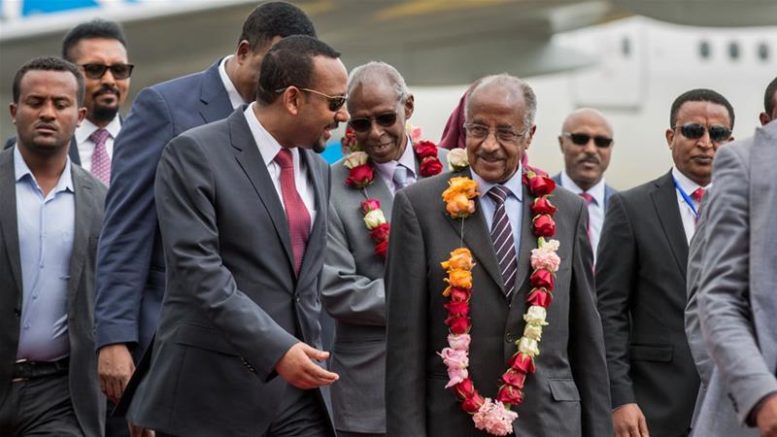A high-level Eritrean delegation led by foreign minister Osman Saleh arrived in the Ethiopian capital, Addis Ababa for talks on ending the decades-long conflict between the two countries.
The delegation – which was received by Ethiopian Prime Minister Abiy Ahmed on Tuesday – also included Eritrean President Isaias Afwerki’s right-hand man Yemane Gebreab.
It is the first time in more than two decades that a top-level delegation from Asmara visits Ethiopia.
The visit comes a week after President Afwerki said the East African country would dispatch a delegation to Addis Ababa to “gauge current development” in the region.
“We will send a delegation to [Addis Ababa] to gauge current developments directly and in depth as well as to chart out a plan for continuous future action,” he said.
‘Committed to reconcile’
Earlier this month, Ethiopia’s new Prime Minister Abiy Ahmed said Addis Ababa would fully accept and implement the terms of a peace agreement between the countries.
“We are fully committed to reconcile with our Eritrean brothers and sisters and extend an invitation to the Eritrean government to start dialogue and establish rapport,” Abiy told parliament earlier this month.
The UN-backed agreement, which was signed in 2000, awarded disputed territories, including the town of Badme, to Asmara.
The two countries fought a bloody border war in 1998 that left more than 80,000 people dead and displaced hundreds of thousands.
Eritrea, which comprised of Ethiopia’s only access to the sea, broke off from its larger neighbour in 1993 leaving Addis Ababa landlocked.
Abebe Aynete, an Addis Abab-based analyst, said the visit could mark the end of the political deadlock between the East African countries.
“This visit is very significant and when the agreement is fully implemented it will mean the people of the two countries can finally have friendly relations. It will also improve the security of the region. The proxy wars between the two countries will also end,” Abebe told Al Jazeera.
“The outcome will be felt not just in the disputed territories but across East Africa. The implementation of the agreement might also lead to political reforms in Eritrea,” he added.

